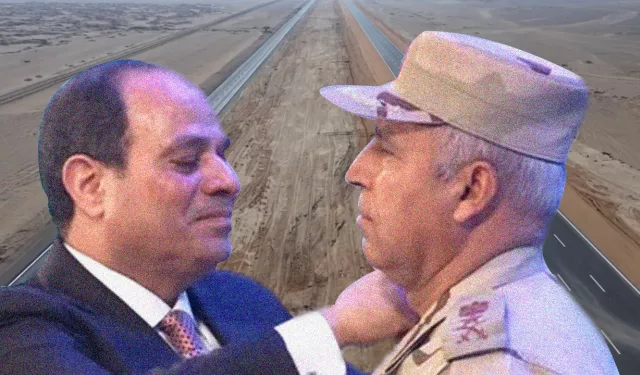
Kamel Al-Wazir: El-Sisi’s golden child
No minister in Egypt’s post-2013 cabinets has enjoyed presidential favor like Kamel Al-Wazir.
Since his 2019 appointment as transport minister, Al-Wazir has steadily ascended the power ladder, landing not only a second portfolio — the Ministry of Industry — but also the title of Deputy Prime Minister for Industrial Development.
In his pre-cabinet years, Al-Wazir was best known as head of the Armed Forces Engineering Authority, a position that placed him in close contact with El-Sisi during the president’s infrastructure push. At public events, the president often lavished him with praise, calling him a trusted executor of state projects.
When Al-Wazir was appointed transport minister in March 2019, it was El-Sisi himself who made the announcement at the commemoration event of Martyrs’ Day, just days after a deadly train crash at Ramses Station.
“You don’t know,” El-Sisi addressed the audience, “but I’m assigning one of the best army officers to this sector [referring to transport]. The army knows this well; it knows what he is capable of.”
When rumors surfaced that Al-Wazir had declined the position, El-Sisi personally refuted them, quoting Al-Wazir as saying, “I am at Egypt’s service, always.”
In that same event, the president promoted him from major general to lieutenant general. The dual hatted minister, in turn, called El-Sisi “a brother, a friend, a commander, and a teacher,” promising to write in his memoirs about the “great man” he had come to know.
“I know so much about him that many of you probably don’t,” he told the audience.
Nothing comes for free
About six months before this event, El-Sisi was inaugurating several electricity projects when he made his now-famous statement, “Nothing comes for free,” in response to demands for improved public services. He later reiterated, “We’ll provide everything you need, but you have to pay. Nothing is free at all.”
Al-Wazir, who was in attendance, smiled with other attendees, internalizing the ethos.
Since taking office, he has steadfastly implemented this policy, ensuring that no government service or product is free of charge.
In September 2020, Decree No. 180 of 2020 transformed the National Authority for Tunnels, which had operated as a public service since its founding in 1983 under Decree No. 113, into an economic public authority, paving the way for fare hikes and revenue generation.
Under his watch, metro fare rose several times. The first was in June 2019, just three months into his tenure, where ticket prices roughly doubled. Another hike quickly followed in January 2024, with fares rising again across all distance categories.
Train services followed suit. Whereas only two fare hikes occurred in the previous 12 years, the man approved two within three, dubbed as “shifts in prices”, with increases as high as 150%, affecting everything from VIP to second-class trains.
Additionally, the Egyptian National Railways imposed new fees under his leadership, pumping billions of pounds into its treasury.
By the end of September 2020, Ashraf Raslan, then chairman of the authority, announced the imposition of fees on passengers carrying more than 12 kg of personal belongings, ranging from 10 to 140 pounds ($0.63-$8.90), as part of the authority’s plan to compensate for its losses.
In a previous statement to Al Manassa, a member of the board of directors of the Railways Authority revealed that these measures boosted the authority’s monthly revenue by 30 to 40 million pounds ($1.75 - $2.33 million), representing about 10% of its total income.
In November, 2019, Al-Wazir stated that fines collected had contributed to the purchase of 10 new locomotives.
National “mega” projects
As El-Sisi championed massive infrastructure expansion, borrowing surged.
During Al-Wazir’s first year in office, transport sector debt ballooned over 40%, and it’s projected to reach 216.5 billion pounds ($4.25 billion) by 2025.
Like the president, Al-Wazir likes to talk of “national projects,” especially given his background in the Armed Forces Engineering Authority, which spearheaded many state projects, including the Suez Canal expansion.
Just two months into his tenure as Minister of Transport, Al-Wazir signed a contract with a consortium comprising Bombardier Transportation, Orascom, and Arab Contractors to build two monorail lines for the New Administrative Capital and 6 October City.
Funded by $4.5 billion in loans, the project faced scrutiny over its feasibility, with some arguing it would primarily benefit the administrative capital’s residents. However, the government defended its economic viability.
In 2023, another loan of nearly 2 billion euros was secured for the first phase of the high-speed electric rail. Addressing concerns about rising ticket prices, the ministry claimed that even wealthy businesspeople “have a right to quality” because they are the ones “implementing the investment projects.”
Given his record—and perhaps for other reasons— Al-Wazir was chosen to oversee the Ministry of Industry alongside Transport, despite the lack of connection between the two sectors and his absence of industrial expertise.
However, in statements following his swearing-in, he cited his vision to develop the transportation sector as grounds for his appointment.
“My vision and the challenges I tackled in developing the Ministry of Transportation’s infrastructure were key factors. Since President Abdel Fattah El-Sisi assigned me to assume duties of the ministry, 80% of the work has been completed. Now, the state is seeking to benefit my efforts to advance Egypt’s industrial sector.”
(*) A version of this article first appeared in Arabic on July 3, 2024.
